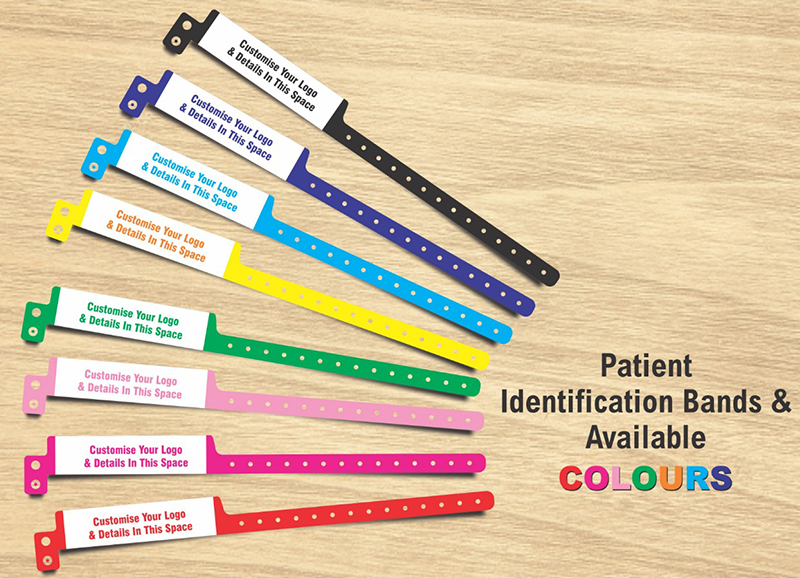The Connection Between a Patient Identification Band and Enhanced Patient Security
The Connection Between a Patient Identification Band and Enhanced Patient Security
Blog Article
Just How Patient Identification Band Plays an Essential Role in Patient Monitoring and Care
Patient Identification bands act as a vital cog in the elaborate equipment of medical care systems, functioning as a safeguard against medical mistakes. As the frontline tool for verifying Patient identification, these bands underpin essential procedures from carrying out the proper medication to making certain the best person goes through the assigned procedure. The profound effect of such an ostensibly simple tool on Patient security, experience and results could surprise numerous, leaving one to contemplate the possible developments and advancements that can additionally enhance their performance.

Understanding the Basics of Patient Identification Bands
Despite the simplicity of their look, Patient Identification bands serve a critical role in medical care settings. They typically display the Patient's full name, day of birth, and a special Identification number, offering as the key source of Patient Identification - patient identification band. The usage of these Identification bands is considered a global protocol in medical care, aimed at making certain Patient safety and precision of care delivery.
The Role of Patient Identification Bands in Reducing Clinical Mistakes
An incredible variety of medical errors occur due to Patient misidentification, highlighting the indispensable function of Patient Identification bands. These basic, yet important, devices, aid doctor in correctly determining clients, therefore reducing the possibility of mistakes. These bands, usually geared up with barcodes or QR codes, have important Patient details such as name, age, and medical history. This ensures that the ideal care is provided to the best Patient at the right time. In high-stress atmospheres where clinical personnel juggle numerous duties, Patient Identification bands function as a fast and dependable recommendation. Importantly, they offer a secure against misidentification, decreasing the risk of inaccurate medical diagnoses, medication mistakes, and unneeded procedures, therefore playing an essential duty in minimizing clinical errors.
Enhancing Patient Safety With Identification Bands

The Influence of Patient Identification Bands on Patient Experience
Almost all people in health care settings experience the usage of Identification bands during their treatment trip. These bands, usually used around the wrist, have an extensive impact on the Patient experience. They serve as a continuous, noticeable reminder of the Patient's identification and medical conditions, guaranteeing patients that they are identified and cared for.
Future Developments and Innovations in Patient Identification Bands Technology
While existing Patient Identification bands have actually verified efficient in improving care, the perspective of technical improvements assures also higher renovations. Arising technologies, such as radio-frequency Identification (RFID) and Quick Response (QR) codes, provide a new level of accuracy and efficiency. RFID tags can supply real-time Patient place tracking, while QR codes can store comprehensive Patient details obtainable using mobile phone scanning. Moreover, integration of expert system can make it possible for automated Patient information check my source analysis, forecasting possible health risks and enhancing therapy strategies. Biocompatible materials are likewise being explored to enhance Patient comfort. These improvements not only bolster Patient safety but also improve healthcare operations. Hence, future advancements in Patient Identification bands hold substantial possibility in transforming Patient care.
Final thought
Patient Identification bands are an important asset in health care, making sure exact Patient Identification and lowering clinical mistakes. These tools improve Patient security, boost self-confidence in medical care systems, and boost Patient experiences and outcomes. With the capacity wikipedia reference for future innovations in Identification band modern technology, their function in Patient administration and care is established to end up being much more vital, strengthening their value in the shipment of reliable and safe health care.
Just How Patient Identification Band Plays a Critical Role in Patient Administration and Care
A shocking number of clinical mistakes happen due to Patient misidentification, emphasizing the vital duty of Patient Identification bands. patient identification band.Undoubtedly, the usage of Patient Identification bands substantially improves Patient safety and security in health care settings. Therefore, future technologies in Patient Identification bands hold considerable capacity in reinventing Patient treatment
Patient Identification bands are a crucial possession in healthcare, making sure accurate Patient Identification and lowering clinical errors.
Report this page